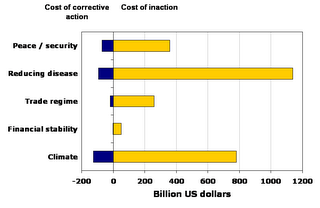Global public goods - the Achilles heal of globalisation
 Attended a stimulating session today on "Global Public Goods" (FAQ) run by the ubiquitous penseurs of globalisation, E3G. The idea is that there are important global things [goods, services, networks, resilience, risk reduction] that are under-provided, for example: reduction in disease transmission, financial system resilience, stability of the the climate, control of criminal networks, difusion of innovation, energy security and possibly values and norms like human rights. We underprovide mainly because of collective action failures - between nations (and between generations). Public goods theory stresses the non-rival and non-excludable characteristics of public goods, and these are useful characteristics to identify as they often foreshadow collective action failure. Well, they are useful only as long as the definitions are not applied too pedantically.
Attended a stimulating session today on "Global Public Goods" (FAQ) run by the ubiquitous penseurs of globalisation, E3G. The idea is that there are important global things [goods, services, networks, resilience, risk reduction] that are under-provided, for example: reduction in disease transmission, financial system resilience, stability of the the climate, control of criminal networks, difusion of innovation, energy security and possibly values and norms like human rights. We underprovide mainly because of collective action failures - between nations (and between generations). Public goods theory stresses the non-rival and non-excludable characteristics of public goods, and these are useful characteristics to identify as they often foreshadow collective action failure. Well, they are useful only as long as the definitions are not applied too pedantically.
The chart shows one academic's attempt to compare the costs of acting to address these challenges with the cost of inaction in a few of the areas classed as global public goods... Even if wrong by miles, it still raises the question are we, and by how much, underproviding these things? We could spend more on these things and be substantially better off but we don't for a variety of reasons, including but not exclusively:
- Their global nature and the need for large numbers of countries or all to be involved, combined with weak institutions for co-operation.
- The fact that everyone benefits regardless of who pays so there are incentives to free-ride;
- Concern that spending on these things will displace aid transfers and compromise efforts to focus on poverty reduction (ie. the provision of private goods and national public goods in poor countries through overseas development assistance)
- That governments are often loss-minimisers and examine costs and benefits asymmetrically, focussing on what they lose in co-operation with greater emphasis than on what they gain.
- Short-termism - and a huge discount rate applied to the value of future welfare
But in many ways that's the easy part... the real problem is how to achieve the necessary collective action... Knowing there is a robust economic case for doing it is the start, but how to fight through the seemingly irrational and self-harming political economy that actually does make the decisions about all this? One approach is to be clear what is new and interesting about analysing these issues through undertsanding the characteristics of global public goods, and making clear distinctions between the case for providing these and the case for provision of private and national public goods through aid. Each of the public goods in question has subtley different characteristics and different reasons why it is likely to be under-provided... teasing those out will help. Once the underlying failure is understood and assessed, then the analysis should return to political economy and how to cause the necessary collective action to happen in the real world - informed by a new and fresh analysis of the underlying failure.
DfID is taking the initiative in taking this work forward with E3G, and that is to be welcomed!



2 comments:
The analysis sound interesting and useful, but a bit dry? Insight into what motivates large numbers of people to behave altruistically (or at least not in very short term way with narrow view of their own interests) is also useful. Social and anthropological analysis of positive movements for change also helpful?
Hi Caspar, you are absolutely right... most economics denies a place for pure altruism, or seeks to explain its appearance through more elaborate definitions of 'utility', which include feelings of well-being and the purgative joys of self-sacrifice or strong herding instincts which rely on the value of empathy to the individual.
I think the basic analysis of public goods helps us to identify where we should expect to find collective action failure and underprovision - but only a pointer as to where to look. Entire civilisations and social systems (perhaps all societies) have developed in response to collective action problems so you are right to point to the formation of social capital and movements as a response. I suppose what is interesting about global public goods is that these structures are especially weak at international level, compared to national level... so we might expect an over-provision of national public goods compared to global public goods: for example, we may immunise everyone in the UK against bird flu, but give inadequate attention to controlling the spread of the disease internationally. Shane Tomlinson is doing the main work on this at E3G... he'd probably welcome a discussion on the points you raise.
Post a Comment